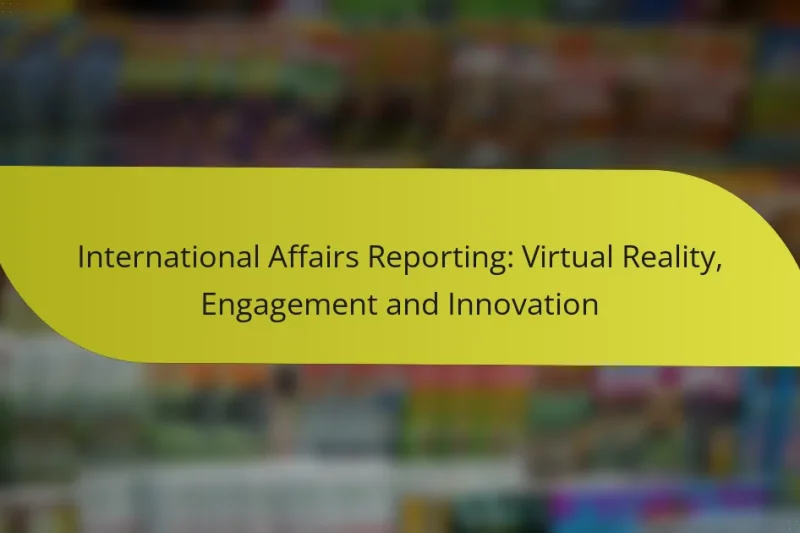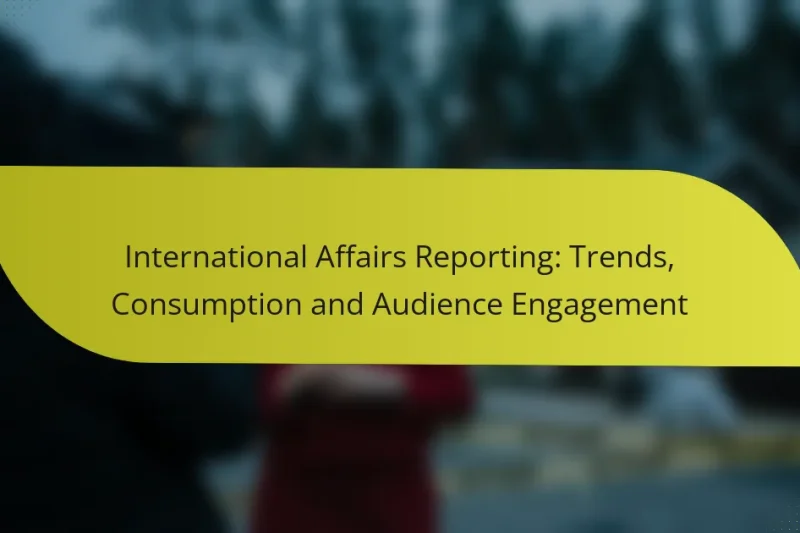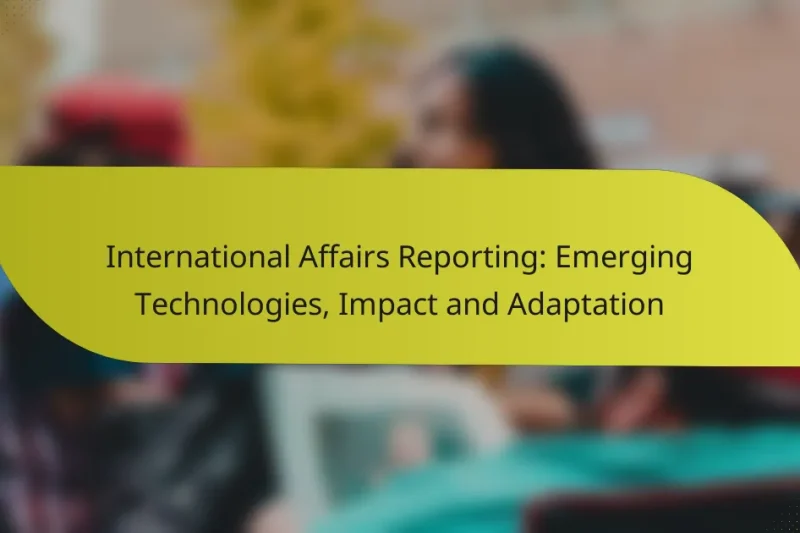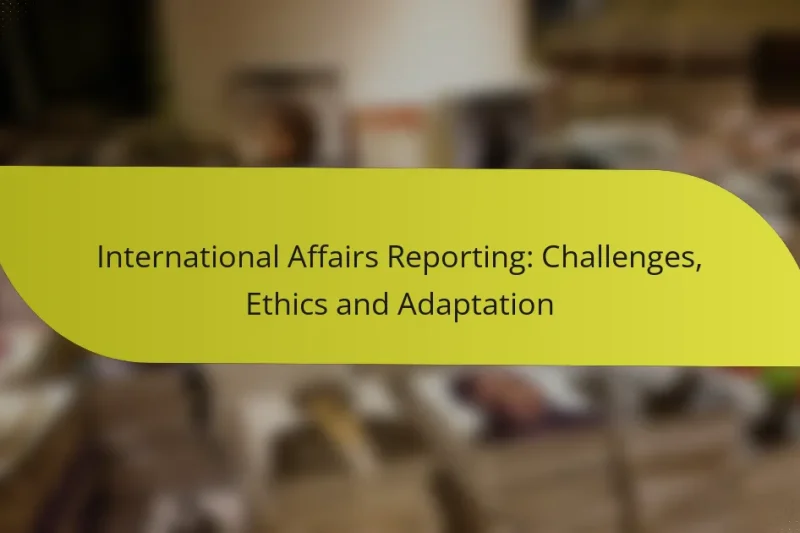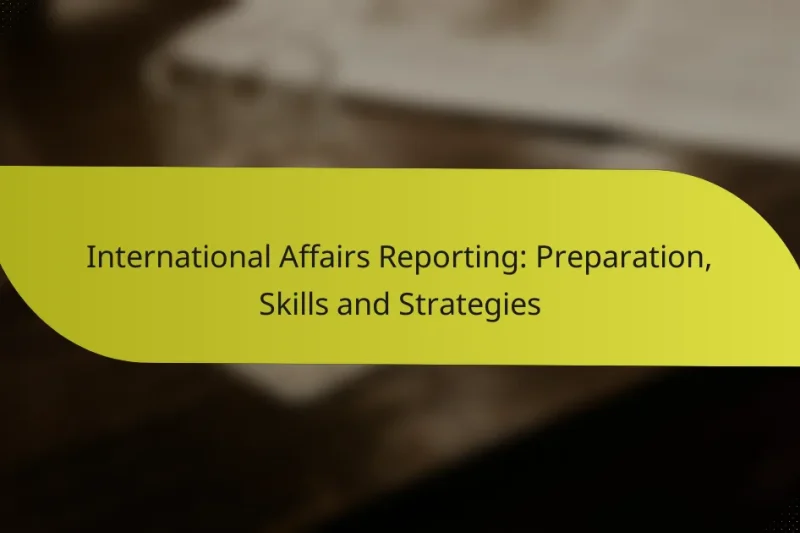Virtual reality (VR) is revolutionizing international affairs reporting by offering immersive experiences that deepen audience engagement … International Affairs Reporting: Virtual Reality, Engagement and InnovationRead more
Future Trends in International Affairs Reporting
The landscape of international affairs reporting is rapidly evolving, driven by key trends such as the integration of data journalism and multimedia storytelling. As technology enhances the speed and accessibility of news, journalists face challenges like information overload while striving to maintain credibility. This dynamic environment necessitates a stronger focus on local perspectives to engage audiences effectively.
International Affairs Reporting: Trends, Consumption and Audience Engagement
International affairs reporting is undergoing significant transformation as it increasingly embraces digital platforms and multimedia content, … International Affairs Reporting: Trends, Consumption and Audience EngagementRead more
International Affairs Reporting: Predictions, Trends and Challenges
International affairs reporting is undergoing a transformative shift, characterized by the rise of data journalism and … International Affairs Reporting: Predictions, Trends and ChallengesRead more
International Affairs Reporting: Emerging Technologies, Impact and Adaptation
Emerging technologies are revolutionizing international affairs reporting by enhancing data analysis, transparency, and storytelling. These innovations … International Affairs Reporting: Emerging Technologies, Impact and AdaptationRead more
International Affairs Reporting: Globalization, Influence and Trends
International affairs reporting is profoundly shaped by globalization, which facilitates the rapid exchange of information and … International Affairs Reporting: Globalization, Influence and TrendsRead more
International Affairs Reporting: Challenges, Ethics and Adaptation
International affairs reporting is fraught with challenges such as access to reliable information, political bias, and … International Affairs Reporting: Challenges, Ethics and AdaptationRead more
International Affairs Reporting: Preparation, Skills and Strategies
International affairs reporting requires a unique blend of skills, including analytical thinking, cultural awareness, and language … International Affairs Reporting: Preparation, Skills and StrategiesRead more
What are the key trends in international affairs reporting?
Key trends in international affairs reporting include the integration of data journalism, the rise of multimedia storytelling, and a stronger focus on local perspectives. These developments reflect the evolving landscape of media consumption and the need for more engaging and informative content.
Increased use of data journalism
Data journalism has become a vital tool in international affairs reporting, allowing journalists to present complex information in a clear and accessible manner. By utilizing statistics, charts, and infographics, reporters can enhance their storytelling and provide readers with a deeper understanding of global issues.
For example, a report on migration patterns may include visual data that illustrates trends over time, making the information more digestible. Journalists should ensure that their data sources are credible and relevant to maintain accuracy and trustworthiness.
Rise of multimedia storytelling
Multimedia storytelling combines text, audio, video, and interactive elements to create a richer narrative experience. This approach engages audiences more effectively, as it caters to different learning styles and preferences, making complex international topics more relatable.
For instance, a news piece on climate change might include video interviews with affected communities, interactive maps showing environmental changes, and audio clips of expert opinions. Reporters should consider the balance of multimedia elements to ensure they complement the written content rather than overwhelm it.
Focus on local perspectives
In international affairs reporting, emphasizing local perspectives is crucial for providing context and depth. By highlighting voices from affected communities, journalists can offer a more nuanced view of global events and their local implications.
For example, instead of solely reporting on a conflict from a national viewpoint, including interviews with local residents can shed light on the human impact of the situation. Reporters should strive to include diverse voices to represent the complexity of international issues accurately.
How is technology shaping international affairs reporting?
Technology is significantly transforming international affairs reporting by enhancing the speed, accuracy, and accessibility of news. Innovations such as artificial intelligence and social media platforms enable journalists to analyze vast amounts of data and disseminate information in real-time.
AI-driven news analysis
AI-driven news analysis utilizes algorithms to sift through large datasets, identifying trends and patterns that may not be immediately apparent to human reporters. This technology can help journalists prioritize stories based on relevance and potential impact, allowing for more informed reporting.
For instance, AI tools can analyze social media sentiment or track geopolitical developments, providing insights that guide editorial decisions. However, reliance on AI should be balanced with human oversight to ensure context and nuance are preserved.
Real-time reporting through social media
Social media has revolutionized real-time reporting by allowing journalists to share updates instantly with a global audience. Platforms like Twitter and Facebook enable reporters to broadcast breaking news, engage with audiences, and gather information from eyewitnesses on the ground.
While this immediacy enhances coverage, it also presents challenges such as the spread of misinformation. Journalists must verify sources and cross-check facts before disseminating information to maintain credibility and accuracy in their reporting.
What challenges do international affairs reporters face?
International affairs reporters encounter numerous challenges, including information overload and the need to maintain credibility and trust. These obstacles can hinder their ability to deliver accurate and timely news to their audiences.
Information overload
Information overload occurs when reporters are inundated with vast amounts of data and news from various sources. This can lead to difficulties in discerning which information is relevant and credible, making it challenging to provide clear and concise reporting.
To manage information overload, reporters should prioritize their sources and focus on those that are reputable and reliable. Utilizing tools like news aggregators can help streamline the information-gathering process, allowing for more efficient analysis and reporting.
Maintaining credibility and trust
Maintaining credibility and trust is crucial for international affairs reporters, as audiences rely on them for accurate information about complex global issues. Any misstep can lead to a loss of audience confidence, which can be difficult to regain.
Reporters should fact-check their information rigorously and cite credible sources to uphold their integrity. Engaging with the audience through transparency about their reporting processes can also foster trust and enhance their reputation in the field.
How can international affairs reporting adapt to changing audiences?
International affairs reporting can adapt to changing audiences by embracing new technologies and understanding the preferences of diverse demographic groups. This involves tailoring content delivery methods and formats to engage readers effectively, particularly as younger generations seek more interactive and accessible information.
Engaging younger demographics
To engage younger demographics, international affairs reporting should focus on platforms popular among younger audiences, such as social media and mobile applications. Content should be concise, visually appealing, and easily shareable to capture attention quickly.
Utilizing storytelling techniques that resonate with younger viewers can also enhance engagement. For instance, incorporating personal narratives or case studies related to global issues can make complex topics more relatable and compelling.
Utilizing interactive content
Interactive content, such as quizzes, polls, and infographics, can significantly enhance audience engagement in international affairs reporting. This type of content encourages active participation, allowing readers to explore topics at their own pace while retaining information more effectively.
Additionally, incorporating multimedia elements like videos and podcasts can cater to different learning styles and preferences. For example, a short video summarizing a complex geopolitical issue can be more impactful than a lengthy article, especially for audiences with limited time.
What role do global events play in shaping reporting strategies?
Global events significantly influence reporting strategies by dictating the focus and urgency of news coverage. Journalists must adapt their approaches to reflect the evolving nature of international relations and public interest.
Impact of geopolitical crises
Geopolitical crises often lead to heightened media attention and a shift in reporting priorities. Journalists must quickly gather information from various sources, ensuring accuracy while navigating the complexities of conflict zones.
For example, during a military conflict, reporters may prioritize real-time updates and on-the-ground accounts over in-depth analysis. This shift can result in a more immediate, yet potentially less nuanced, portrayal of events.
Influence of international summits
International summits serve as critical platforms for diplomacy and negotiation, significantly impacting reporting strategies. Coverage often focuses on key agreements, speeches, and the implications for global relations.
Reporters should prepare for these events by researching participating nations and their agendas. Effective reporting may involve live updates, expert commentary, and follow-up analyses to provide context and clarity to audiences.
How can international affairs reporting improve audience engagement?
International affairs reporting can enhance audience engagement by tailoring content to meet the interests and preferences of readers. This involves utilizing data analytics and feedback mechanisms to create more relevant and personalized news experiences.
Personalization of news content
Personalization in news content involves curating articles and updates based on individual reader preferences, behaviors, and demographics. By leveraging algorithms and user data, media outlets can deliver stories that resonate more with specific audiences, increasing the likelihood of engagement.
For example, a news platform might offer users the option to select topics of interest, such as climate change or global trade, allowing them to receive tailored updates. This approach can lead to higher click-through rates and more time spent on the site.
Community-driven reporting initiatives
Community-driven reporting initiatives focus on involving local communities in the news creation process. This can include citizen journalism, where individuals contribute stories and insights from their perspectives, enriching the overall narrative of international affairs.
Such initiatives can foster a sense of ownership and relevance among community members, as they see their voices reflected in the news. Media organizations can support this by providing training and resources to empower local reporters, ensuring diverse viewpoints are represented.
What are the ethical considerations in international affairs reporting?
Ethical considerations in international affairs reporting include maintaining accuracy, ensuring fairness, and respecting the dignity of individuals and communities. Journalists must navigate the complexities of bias, representation, and the potential impact of their reporting on global perceptions and policies.
Balancing objectivity and advocacy
Balancing objectivity and advocacy is crucial for credible international reporting. Journalists should strive to present facts without bias while also recognizing the importance of advocating for human rights and justice. This requires a careful approach to language and framing, ensuring that reporting does not inadvertently promote a particular agenda.
For example, when covering humanitarian crises, reporters can highlight the plight of affected populations while providing context about the political dynamics at play. This dual focus helps maintain journalistic integrity while still raising awareness about critical issues.
Addressing misinformation
Addressing misinformation is a significant challenge in international affairs reporting, particularly in an era of rapid information dissemination. Journalists must verify sources and cross-check facts before publication to combat the spread of false narratives. This involves utilizing reliable databases, expert consultations, and established news outlets as references.
To effectively counter misinformation, reporters can employ strategies such as fact-checking articles, issuing corrections promptly, and engaging with audiences through social media to clarify misconceptions. By prioritizing accuracy and transparency, journalists can help foster a more informed public discourse on international issues.
